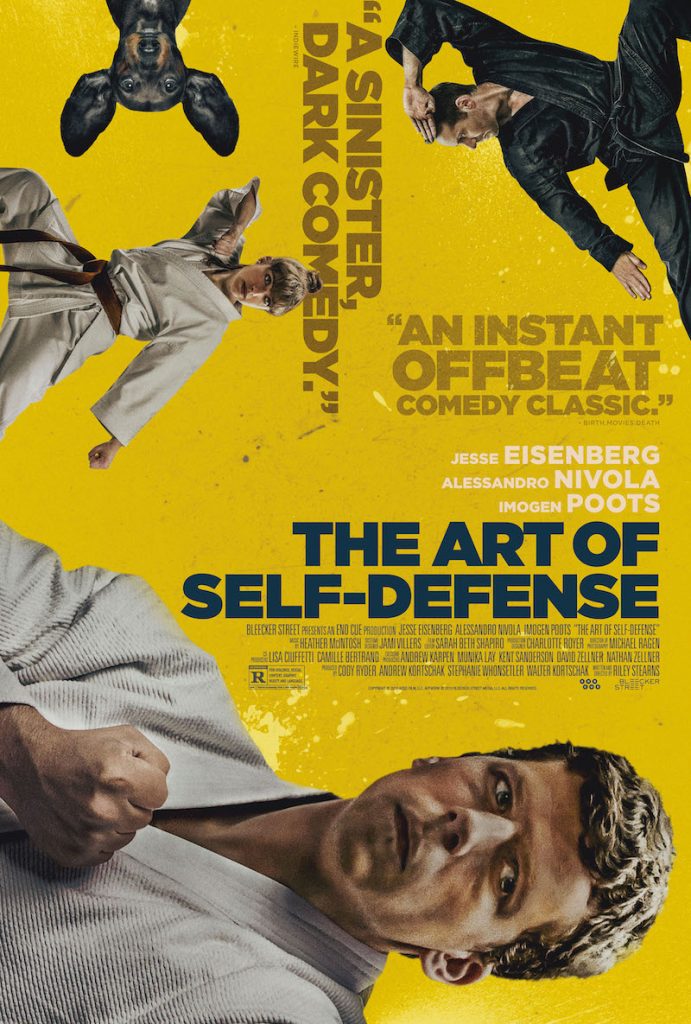Movie Breakdown: The Art Of Self Defense (Noah)
Pre-Screening Stance:
Trailers for The Art of Self Defense paint it as the type of relatively low-budget indie we just don’t see anymore. It looks sparse and artsy and a perfect vehicle for the recently quiet, master of nerd-creep, Jesse Eisenberg. I’ll say, tentatively, I’m excited.
Post-Screening Ramble:
There’s a real opportunity to deem The Art of Self Defense as a hyper-indie Fight Club. A broken (physically and mentally) corporate drone (Jesse Eisenberg, showing off his full range of off-kilter creepiness) attempts to reestablish his latent masculinity through late-night violence (in a dingy karate dojo instead of a dingy basement) with a helping hand from a hyper-masculine beef-cake (Alessandro Nivola absolutely owning the role) with dubious intent. There’s even a striking band of surrealism that cuts through the middle of the film – a low-key dream-quality that director Riley Stearns keeps just on the periphery until the final act, when the film dips precariously towards the edge of the rails. And though similarities do exist – in theme and narrative – The Art of Self Defense is its own oddball spin on the stuttering tropes of masculinity. Eisenberg’s Casey – the type of sweaty-palmed office loner, it’s hard not to cringe at – is assaulted randomly by a motorcycle gang driving him deeper down the fear spiral he’s already clinging to. He finds solace in a back-alley karate dojo run by the enigmatically named Sensei (Nivola) – a flat-toned martial arts master with conservative views and a belief that violence is a cure-all. As Casey dives deeper and deeper into Sensei’s martial arts world, he’s forced to reckon with what it means to be a man, and what darkness he’ll accept to be that. Stearns has happily crafted the type of dark, dark comedy you rarely see anymore, rife with violence and awkwardness, quirkily derived from a world just a shade grittier than the one we know. There’s a deep understanding of the personalities drawn to recreational martial arts and the cult-like undertones that buoy this world. Casey derives confidence and strength (in his own peculiar way) from his full immersion into Sensei’s world, but when he steps too far, he’s exposed to the allure and the addictive nature of violent masculinity. The film never sticks the landing in terms of what exactly it’s trying to say about masculinity and the common perceptions of how violence is connected to it, but the ride, surreal, laugh-out loud funny and anchored by fantastic performances by Eisenberg and Nivola, is fully worth taking.
One Last Thought:
The Art of Self Defense is in itself an ode to schlocky kung-fu films. There’s a moment in the middle where Eisenberg picks up this strange vocal effect and it’s slightly off-putting until you realize he’s invoking the sort of bad dubbing that made kung-fu films in the 60s and 70s so weirdly enjoyable. The rest of the film subtly follows suit.
Another Last Thought:
Seriously, I did Tae Kwon Do for a long, long time and no film has ever portrayed the world of recreational martial arts more accurately. Every single conversation in the locker room, every blast of unleashed maleness, every sweat-soaked uniform feels dragged from my own experience.
And Another Last Thought:
Imogen Poots does good work in this film but sadly her character is under-written and more of a pivot point for the main character, than a character in herself. Still, Poots is one of the more interesting actors working today.


